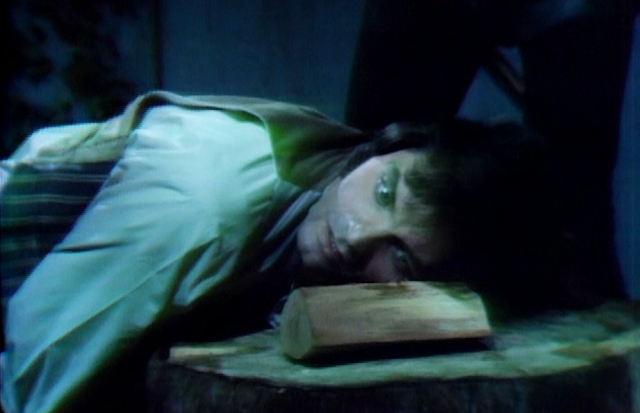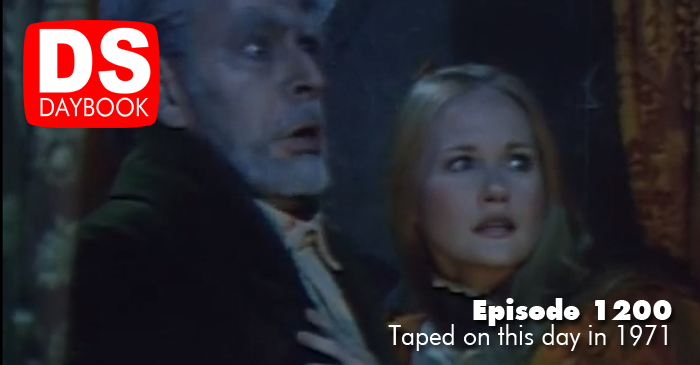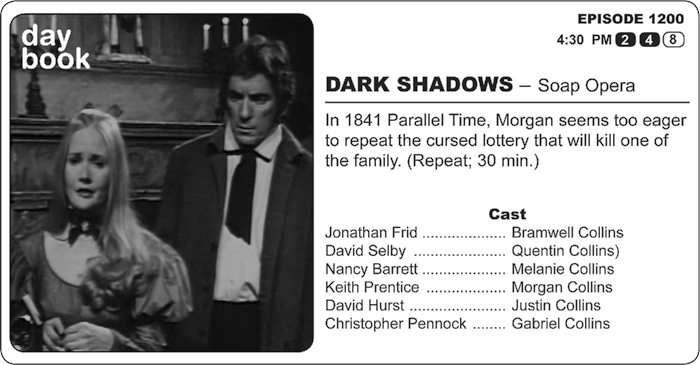Taped on this date in 1971: Episode 1196
By PATRICK McCRAY
“Head Alert!” Judah Zachery brings Valentine’s Day a month ahead of schedule when he robs Angelique of her powers just moments before Quentin’s planned execution. Angelique: Lara Parker. (Repeat; 30 min.)
Angelique’s plan to fight fire with voodoo fails when Judah Zachery removes the powers he gave her, 100 years prior. After persuading Charles Dawson to free her by gently beating him to death with a candlestick, she races to the site where Quentin and Desmond are about to go head-to-head in a laundry basket that will probably never be used as such again.
Today, I may be on Judah Zachery‘s side. And I didn’t realize that until I sat down to write this. I will have to go back and look at what he did that was so terrible, but the 20th and 21st Centuries have made up their minds on the witchcraft issue. Those who don’t believe in it aren’t exactly going to be holding trials. Those who do believe are more than likely participating in it.
Structurally, this episode falls in an awkward place. The most exciting part of this sequence of action was yesterday when Barnabas explained to Angelique that she’s just not a member of Club Corporeal, and so they can never really have a substantial love life. As many times as I have watched that moment in 1195 where Barnabas denies her desires because of her occult nature, I have had a hard time understanding it. I have always operated under the assumption that the endowment of her powers has, by its very nature, robbed her of something crucial. I think it’s something that Barnabas senses more than he can fully intellectualize; his objection is not so much about her being “a witch,“ with the moral baggage that comes with it. Instead, it is about the detachment that comes with that much power.
A relationship is an endeavor primarily driven by emotion. Emotion isn’t always pretty. The more power someone has to act on them, the more damage they can do. Angelique swings back-and-forth between benevolence and rampant awfulosity. The latter nogoodnikism that trails around her in the DS “timeline” is a bloody testament to my point. It’s all good and well to breathe and count to 10, but what does it mean for someone who can reverse time?
Barnabas reacts from the mindset of an abuse survivor, and as sad as that is, it’s about time he moved proactively on that. Because he does measure his response to her love by her capacity to do damage. And, okay. I fess up. (pause) Yes, it’s very convenient for this universe to then remove her powers shortly after this conversation with Barnabas. But let’s look the army medic in the eye; writing fiction means dusting for the fingerprints of coincidence. Dark Shadows simply doesn’t have the time left to disguise that obvious fact with a finesse we’ve all outgrown.
Writers of fiction are very quick to have characters reject godhood. A little conveniently so. Frankly, I find the person who rejects power without at least browsing the catalog to be a little suspect. Yes, Uncle Stan told us that, “with great power comes great responsibility,“ and far be it for me to question him. But at the same time, there are a lot of corollaries.
For one thing, maybe it’s not as much responsibility as it seems. Or maybe the exercise of that responsibility isn’t really that difficult. Ultimately, I think most writers are taking the lazy, easy way out when they have characters make these antitheistic pronouncements. This is pertinent to Angelique because she doesn’t voluntarily give up her powers. Judah Zachery giveth. Judah Zachery taketh away.
And Angelique is no idiot. She’s going to hold onto these abilities because, as a mortal from the 1690s, she knows exactly how miserable life can be. So, where does that leave Barnabas?
By curing him of his vampirism, she has made a more profound sacrifice than we might initially think. Okay, Barnabas might believe it’s a stretch for a mortal to love a witch, but it’s an even greater leap to expect any immortal, nearly-omnipotent being to love a creature who is going to age and wither astonishingly quickly, all things considered. Although the vampire’s curse was meant as a punishment, perhaps subconsciously, she also realized that it was the only way they could be together. How else was he supposed to accompany her through time, given that the power to make or break a witch seems to be unique to Magus Zachery? By the 1790s, she has been like this for 100 years. And even in that time, who knows how often she has ping-ponged throughout the centuries? For her to stifle her abilities and risk everything to travel to the American wilderness for this man is perhaps more admirable than anything done by her rival. Josette agrees to an arranged marriage to a guy she loves, picks up a free mansion Maine, and calls it a day. That’s about as brave as picking out a value meal at Subway.
Judah Zachery is doing her a favor. Think of the size of Angelique‘s sacrifice when she turns Barnabas back into a human. She is condemning him to die the death of an ordinary man, and she is serving herself the punishment of having to watch it, anticipating nothing but a nearly-eternal life without him once he passes away.
It’s a perspective the changes things just a tad. And before you stop me from crying too athletically into my Gibson, that degree of love could explain the degree of wrath that she’s shown so many times. One hundred years of immortality might be enough to detach anyone from the experience of being human, and perhaps that’s why Barabas rejects her. Judah Zachery is not exactly Santa Claus, but by turning her back into a mortal, he has (even if accidentally) given Angelique the gift of human relatability. The gift of her powers helped her find Barnabas. Rescinding them is the one thing that could help her keep him.
This episode was broadcast Jan. 25, 1971.




